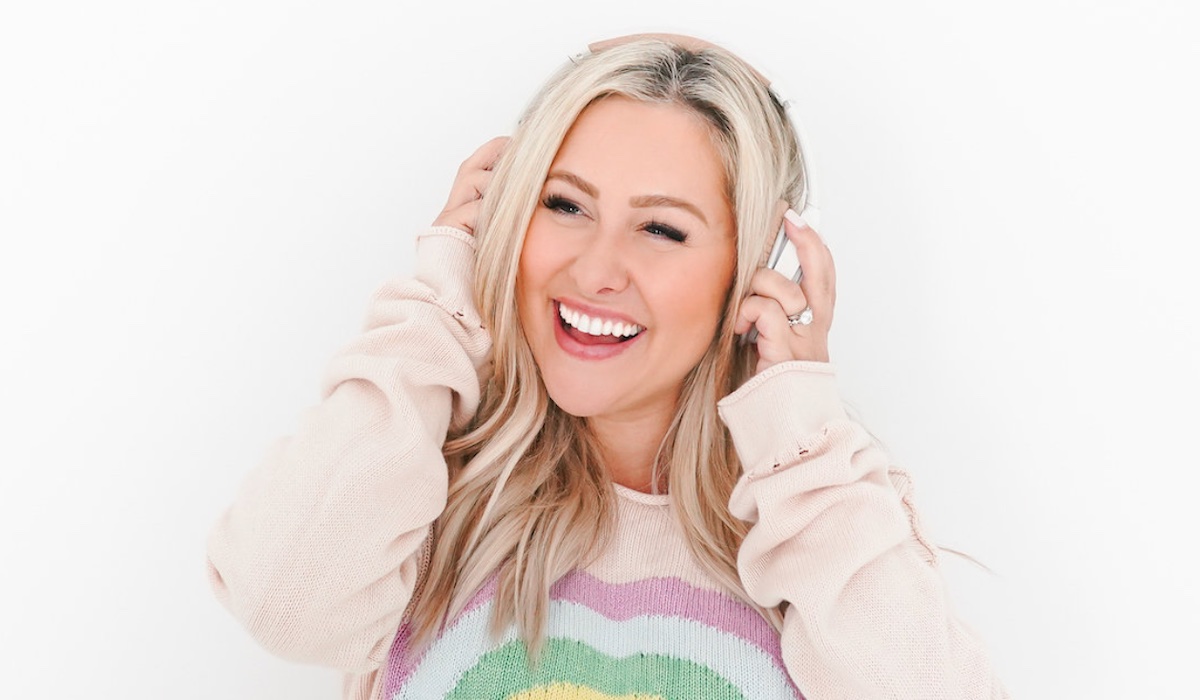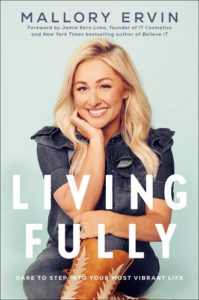Mallory Ervin Says Being “Just Fine” Is the New Rock Bottom. Here’s Why Accepting the Status Quo Is Hurting You and How You Can Change It

It feels like Mallory Ervin has lived 10 lives in her 36 years. It’s not just that Ervin has packed in more laudable titles to count on your right hand, including Miss Kentucky, three-time contestant on “The Amazing Race,” YouTube personality, podcast host, and now author. It’s also because Ervin has always presented herself in the public eye equally with such gravitas and grace—even when she’s revealing some of her darkest struggles. You feel like you know her and she knows you.
This warmth rings just as true on the pages of her new book, Living Fully, as it does when you’re chatting with her—which I did over Zoom this past week. Ervin opened up about her “crippling” pill addiction that nearly took her life and why she had to tell her story. The through-line of what she advocates for in all her work today is that we have a choice to “live fully.” Too often do we accept the status quo, or as Ervin calls it living with a “just fine” mentality. This inadvertently robs us of the greatness we can have in our lives.
There is “another way to live,” believes Ervin. We can each have days that brim with intention, honesty, and radical authenticity. “I knew this was going be an undertaking,” she says about writing her book. “This is my greatest vulnerability—and the only reason that I wrote it was to help see that they can live a bigger life. I want it to be a wake-up call, and I want it to be a stay awake call.”
A Conversation with Mallory Ervin
You encourage readers to resist the urge to be “just fine.” Talk to me being “just fine”—what it means to you and how it can rob us.
This came later in my life. I had a great childhood, then rock bottom came later. My perfectionism became crippling to me, and I experienced this huge spiral. I had to fight for my life. I would not be alive today had I not gone through what I went through.
In the last eight years, when I haven’t been fighting for my life, I’ve been growing a business and rocking and rolling, but I would still slip into this cruise control state of being. It’s like the absence of bad is a qualifier for a good life—and that is just because nothing bad may be going on. My husband’s happy, and my kids are happy. That is a good life. But then I would realize, no way. I fought for my life eight years ago and I will not live like this, in cruise control. So it [“just fine”] was born from this. I had to transform and do so much work to get myself out of the cycle of addiction and then go underneath that.
It can be so easy, like gravity, to go back to a baseline of being just fine. It’s like homeostasis. It’s just the way that it is. So “just fine” means staying there. And I will not accept a life like that because I don’t believe that that’s the way that life is meant to be. I hit a real rock bottom in my life with my addiction, but this [“just fine] is also a rock bottom. And it’s almost a worse rock bottom because there’s no real red flag.
So if there is no glaring issue, like there was for you and your addiction, this can be a reason to keep being “just fine” and not ask for more?
When there’s a red flag—and there were so many red flags around me and people knew I needed help—then your people will hopefully help you get the help you need. There is a clear path forward. But when you don’t have a red flag and may just have the feelings of things not being right, you might wake up in the morning feeling dissatisfied with your life, and adopt a mentality of not wanting to rock the boat—because things are just fine. And you may worry rocking the boat is going to make things worse. Like why open that door? I don’t know what’s behind it. This is familiar. This is easy and it’s comfortable. That is what I never thought I would set out on a crusade to do: to say don’t settle for this just fine way of being!
I want it to be a wake-up call for people.
You use the words “easy” and “comfortable.” That is a current American default. It can be hard to face the real stuff—the sad, the beautiful, the ugly—just so we can keep things easy. How do you feel about this?
My generation, our generation, values easy, comfortable, no problems. I think of my grandparents and I wrote a whole chapter about this. I call my grandparents an endangered species. They’ve experienced vast adversity over and over and over. They had children die. They had a famine. They had drought. They had their businesses fail. It happened over and over for my grandpa; he experienced all of this hardship. And I went home [to Kentucky] one weekend when I was writing the book. I kept getting pulled back to our family farm and I decided to write a chapter on getting through these adverse times. I asked my grandfather, ‘how did you make it through all those hard times?’ And he said, ‘you know, we didn’t have any hard times.’ And I was like, that’s it! They just don’t see it like that. That is life. They’ve always accepted the adversity. It’s just the way they lived. They took the risks.
 I’ve thought about that. I don’t want to live a life that’s in avoidance of pain. I want to avoid not walking into things that are bigger than me that often include pain. I’m more afraid of missing out on that life than I am of the pain that could come with it. Now that is something that I’ve seen over and over: People just want easy. I lived a great existence before, but I never went deep. I never let myself get to the pain points. And then when I did, when I went through that thing in my life and I came out on the other side, the bright was so much brighter.
I’ve thought about that. I don’t want to live a life that’s in avoidance of pain. I want to avoid not walking into things that are bigger than me that often include pain. I’m more afraid of missing out on that life than I am of the pain that could come with it. Now that is something that I’ve seen over and over: People just want easy. I lived a great existence before, but I never went deep. I never let myself get to the pain points. And then when I did, when I went through that thing in my life and I came out on the other side, the bright was so much brighter.
The thing is, it can be easy—but you’re going to miss out on another level of joy and vibrance and fulfillment if easy is all that you want. But I don’t think easy is what people want. I just don’t think they know the difference. I don’t think they know that in choosing easy, they are sacrificing true fulfillment.
For somebody who is reading this and wants to start living fully, where do they start?
With awareness. I used to hate the term awareness because I thought, I am aware! I am awake! You think awake is aware, but it is not. You must slow down enough in your life to notice what is missing and what’s going on.
I know you probably move a hundred miles an hour. I move a hundred miles an hour. So many people today are just so busy. They spend their whole lives going and doing. And if you don’t take a moment to notice, if you don’t have something that stops you in your tracks, as I did with my drug addiction, people don’t stop. And so, for awareness, I feel if you’re reading this, you’ve got the feeling in the back of your mind already. I believe you’re already wanting something more. So you’re already one step into this. The next step is awareness. It is a constant awareness. You must take the time to just sit and think.
I wrote a whole chapter in the book about ignoring the noise. Life and everything is so noisy. We take our phones into the bathroom. It’s like we cannot have a moment because there are so many distractions. But when we start with this awareness, we will start to see things, including patterns that resurface in our life. Then we can start paying attention to those patterns and lean into the willingness to do something different, maybe that is not easy. Once you start living this way, it’s harder to go back to living in this baseline, cruise control, “just fine” way.
Mallory Ervin is a Kentucky-grown, Nashville-living author, TV personality, and advocate. From her time in the Miss America pageant to being a three-time contestant on The Amazing Race, Mallory turned her passion for sharing her love of fashion, beauty, and life into a platform for impact. Today she runs a global lifestyle brand she founded in 2016, hosts the Living Fully podcast where she encourages and inspires her dedicated following to seek joy and live fully, and appears across platforms ranging from Instagram to YouTube sharing her life and message of living fully. To learn more visit malloryervin.com. You can order her new book, Living Fully, here.


